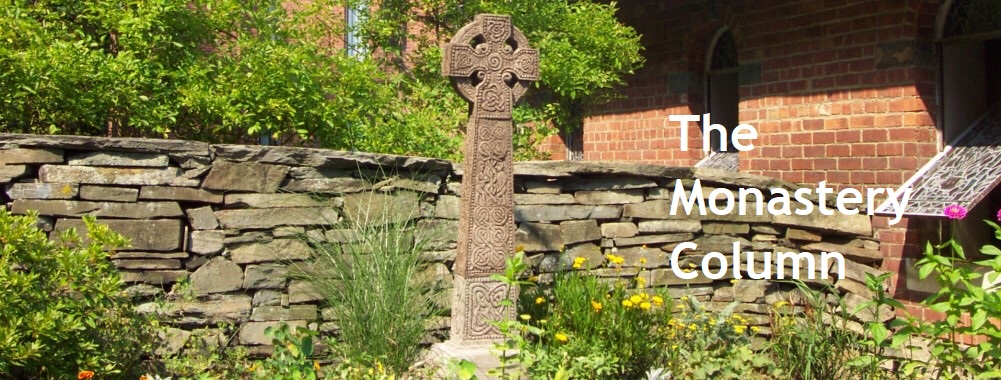I'm late today. I've been conducting this weekend's Advent Retreat along with my friends Suzanne Guthrie and Sister Helena Marie of the Community of the Holy Spirit, and I was with the retreat group this morning, at the time I usually use for blogging.
We built the retreat around the principal event of the weekend, which was a performance of Claudio Monteverdi's Vespers of the Blessed Virgin performed by Kairos, the choral group that is Artist in Residence here at Holy Cross.
So for the retreat we talked about the Vespers and about Mary. Suzanne used a lot of beautiful slides of various art works and wove them together with a meditation on Mary. It was fun to watch a group of ordinary Episcopalians wrestle with themes of the place of Mary in the Church and in their lives. And I'll have to say that much of what they shared this morning was extremely moving. One of the participants said that what he saw this weekend was Mary bringing the Body of Christ into the world once again.
But what has filled me so full this weekend was the performance of the Vespers itself. It's one of the most popular of Monteverdi's works, but not often performed because the resources for it are not easy to assemble - a double choir who can sing very complicated Renaissance music and an orchestra that has not only the usual Violins, Violas, Cellos and an Organ, but also Sackbuts (the predecessor of the trombone), Cornettos (a curved wooden flute sort of thing which is wrapped in leather and sounds very much like a cornet) and a Theorbo (a lute that is about 5 feet long).
It was an amazing experience. Seldom have I had the experience of a piece of music revealing so much to me. Monteverdi's brother said of the Vespers that "it had been his intention to make the words the mistress of the harmony and not the servant", or in other words, the meaning of the words was to determine what the music was - apparently a new idea at the time.
And oh, did he ever succeed! The introductory talk before the concert taught us some things to look for: "in altis" (on high) is set to a rising melody and "et humilia" (humble things) is set in a slow, descending scale. Just knowing a couple of things like that was enough to get me noticing so many other ways in which Monteverdi used music to express meaning. One of the most distinctive sounds of the piece is the chorus singing a massive musical sound, often on just one note or a very simple melody, while the orchestra saws and toodles and toots away underneath, and that turns out to be one of the most effective ways of expressing pure praise that I have ever heard.
The piece is composed of very familiar texts - mostly the Psalms and Antiphons from the Office of the Blessed Virgin. I have been singing those Psalms and Antiphons for 50 years, the majority of them in our monastery Church, and I heard things expressed in this piece that I have never encountered before. I came away completely full and also with the conviction that I have a long way to go before I know how to completely use the Psalms in the praise of God. There's work to be done, even after all these years. Not a bad thing to realize.
The Vespers was performed twice, last night and this afternoon, and I was at both performances. Last night the thing that grabbed me most was a trio of male voices, two basses and a tenor, singing of the Seraphim crying out before the Altar in the Temple, of the Father, the Word and the Holy Spirit. The three melodies repeated and wove around each other in a sound that was both soft and very intense, and I felt like I was witnessing the Trinity being sung into being in this world.
This afternoon there were two moments. The first was a tenor duet, "Audi Coelum" (Hear, O heaven) which is sung between one man standing in front of the stage, and a second one who is hidden off to the side. The man in view sings: "Hear, O heaven, hear my words full of longing and pervaded by joy", and the second voice answers from out of nowhere: "Audio", "I hear". At that moment I realized that I was hearing the longing of the whole human race for God, and God's answer to that longing, which we all want so badly to hear.
Then at the very end of the piece the Magnificat is sung. And after everything else that has happened, I was expecting to hear a great blast of praise. That did come, but not until the final "Amen". Instead what came at the beginning of the piece was another tenor duet, again with high, piercing voices, quietly and intensely singing praise while in the background a soprano choir echoed that praise. And I knew I was hearing human beings and angels singing praise to God together.
I was transfixed. Both times. The second time I didn't have the energy to be as emotional as I was last night, and I also caught more of the detailed work of how the Vespers is put together and what it is expressing. But I was transfixed, nevertheless.
And one of the retreatants told me afterward that her favorite part of the whole thing was watching me at the concert. She said: "It's not often that you get to see an adult so completely filled with joy." And I was. I really was.
And so once again, here it is. Life in a monastery. It's pretty wonderful.
And it seems to keep getting better.

No comments:
Post a Comment